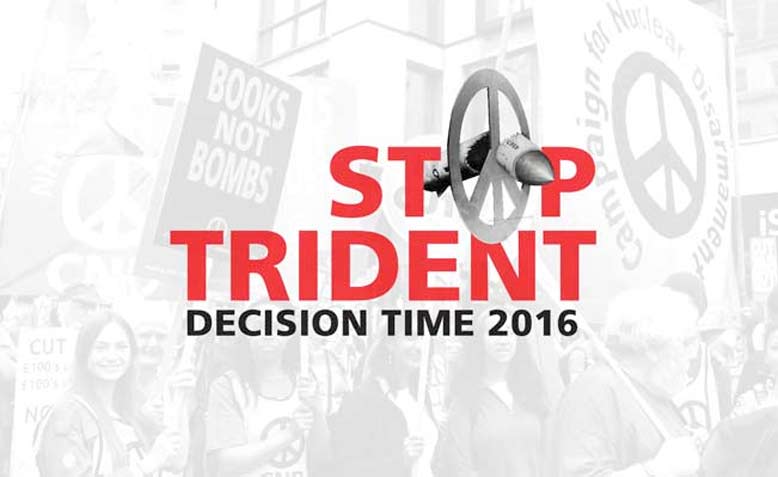 Image: CND
Image: CND
The Tories’ plans to renew the Trident missile system are causing a revival of the anti-nuclear movement, writes Kate Hudson
Trident is at the top of the political agenda. That’s not surprising because an enormous challenge is being mounted to Britain’s political establishment.
The framework for the challenge is the imminent decision – due in parliament this year – on whether or not Trident is replaced, the so-called main gate decision on whether to start cutting the metal on the new subs. Replacement is hugely controversial, not only for long-established moral and legal reasons.
One key factor is the projected cost, which is spiralling massively out of control – it is now suggested to be around £183 billion – at a time of devastating cuts in other areas of public spending. And, crucially, there is growing opposition as it is increasingly recognised to be of no conceivable military or security use.
There is a consistent majority – shown by the polls but denied by pro-Tridenters – against a renewal of nuclear weapons, across civil society from all walks of life and political persuasion. Military figures such as Major General Patrick Cordingley and the former Tory Chair of the Defence Select Committee, Crispin Blunt MP, think its opportunity cost is too high for conventional weapons.
And of course there are trade unions, anti-austerity campaigns and faith communities, and the anti-Trident, anti-austerity political forces that came to prominence around the general election, even if it didn’t translate in all cases into seats: the Green Party, the SNP and Plaid Cymru, as well as the SDLP from Northern Ireland, who stand firmly against Trident.
New on the political stage is opposition from the top of Labour as Jeremy Corbyn has made clear his opposition to Trident and launched Labour’s Defence Review, the outcome of which may well be an anti-Trident position.
Even if there are insufficient numbers in parliament to defeat the government in a vote, this would end the cross-party consensus which the Prime Minister may deem necessary to push Trident through. Corbyn has said that if party policy changes, Labour would cancel Trident replacement once it was in government.
Scotland, which hosts Trident submarines and weapons at Faslane and Coulport, is a very powerful factor here: The Scottish government and virtually all Scottish MPs in Westminster are opposed to Trident. A Westminster vote to impose Trident replacement on Scotland will completely lack legitimacy. Such a vote is likely to trigger a second independence referendum.
And there is nowhere else in the UK for the submarines to go.
So taken together, all these factors mean that we have a genuine opportunity to win the struggle against the quite extraordinarily anachronistic approach of the government: basing our national security on a game of bluff about who will press the button – when in reality they are only concerned with the supposed ‘status’ that possession of weapons of mass destruction bring.
It’s time to stop Trident: join us on February 27th for the biggest anti-nuclear demonstration in a generation and change the face of British politics.
Stop Trident National Demonstration
Assemble 12 noon
Saturday 27 February 2016
Marble Arch, London
March to Trafalgar Square

